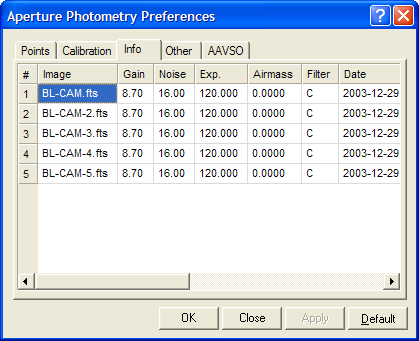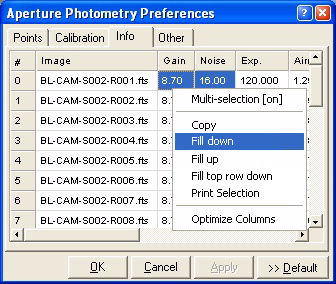To open the Info Preferences page, click
![]() on the Aperture Photometry toolbar
and select the Info tab.
on the Aperture Photometry toolbar
and select the Info tab.
Info Preferences (Apphot)
The Info Preferences page is a member of the Aperture Photometry Preferences dialog. This page shows a table containing the instrumental parameters used in the photometric calculations as obtained from the image headers. The table has one row per image listing the image name, camera gain, readout noise, exposure time, and other properties determined from the image header.
To open the Info Preferences page, click
![]() on the Aperture Photometry toolbar
and select the Info tab.
on the Aperture Photometry toolbar
and select the Info tab.

The table columns can be resized by dragging the vertical separator bars between the column headings. To see more data outside the window, use the scrollbars.
This table is not just for viewing purposes but also provides a feedback mechanism to Mira so that you can correct values used by the photometry calculations or reported in the photometry results. Simply change the values to what they should be and click [Apply] (or [OK]) to accept the changes. Accepting the changes saves the new values in the image headers but does not save the information to the image files. To save it permanently to the image files, you must save the image(s) in the standard way.
Quantities in the Information Table
|
Image |
The name of the image. |
|
Gain |
The camera gain in units of [electrons per ADU]. This is taken from the GAIN keyword in the image header. |
|
Noise |
The readout noise, or baseline noise in the camera image, measured in [electrons]. This is taken from the RDNOISE keyword in the image header. |
|
Exp. |
The exposure time of the observation, measured in [seconds]. This is taken from the value of the EXPTIME keyword in the image header. |
|
Airmass |
The airmass of the observation, taken from the value of the AIRMASS keyword in the image header. |
|
Filter |
The name of the filter used for the observations. This is taken from the FILTER keyword in the image header. |
|
Date |
The date of the image acquisition, taken from the DATE-OBS keyword in the image header. This is the standard value of the UT date at the beginning of the exposure. |
|
Time |
The time of the image acquisition, taken from the DATE-OBS keyword in the image header. This is the standard value of the UT time at the beginning of the exposure. For old-style, pre Y2K FITS headers, this value is taken from the TIME-OBS keyword. |
Changing values in the image information table is simply a matter of clicking on a cell and typing new numbers into the target cell. Additional tools are provided in a pop-up menu that is opened by right-clicking on the table. The menu provides the ability to copy or save data from the table. In addition, if working with an image set, the menu provides tools for copying specific cells to other cells of the table.
|
Note |
The particular commands available in the menu depend upon whether a single image or an image set is being measured and whether a single cell or a range of cells is selected. |
The example below shows how to copy cell contents to other cells of the table. In this example, we wish to copy two items from the first image (top row) to all of the other images. To do this, the table must be in "multi-selection" mode, as indicated by Multi-Selection [on] in the menu (if the table has multi-selection off, click on the Multi-Selection [Off] item to change its state, then right-click to re-open the menu).

To copy cells in multi-selection mode,
Click on the cell(s) in the row you wish to copy.
Drag the mouse to the final cell to highlight a copying range. You may also click on the first cell of the range, then use the standard Windows protocol of holding down the [Shift] key and clicking on the last cell of the range.
Right-click on the table to open the pop-up menu.
In the menu, click the mouse on the Fill... command you wish to use. To copy only the marked cells, use Fill Down or Fill Up.
To update the values to the images, click [Apply] on the dialog.
Changed table values are not saved to the permanent image files unless you use one of the standard saving protocols.